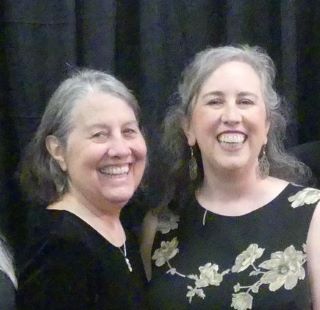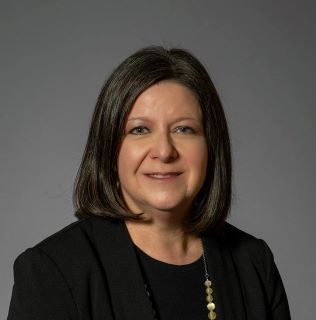-
100% Committed to the Great I Am
 Written by Naijuvelin Diaz, volunteer for Iron Rose Sister Ministries in Venezuela
Written by Naijuvelin Diaz, volunteer for Iron Rose Sister Ministries in VenezuelaLarge crowds were traveling with Jesus, and turning to them he said: “If anyone comes to me and does not hate father and mother, wife and children, brothers and sisters—yes, even their own life—such a person cannot be my disciple. And whoever does not carry their cross and follow me cannot be my disciple. Suppose one of you wants to build a tower. Won’t you first sit down and estimate the cost to see if you have enough money to complete it? For if you lay the foundation and are not able to finish it, everyone who sees it will ridicule you, saying, ‘This person began to build and wasn’t able to finish.’ Or suppose a king is about to go to war against another king. Won’t he first sit down and consider whether he is able with ten thousand men to oppose the one coming against him with twenty thousand? If he is not able, he will send a delegation while the other is still a long way off and will ask for terms of peace. In the same way, those of you who do not give up everything you have cannot be my disciples. (Lk 14:25-33 NIV)
Understanding the meaning of the word committed is important. Close in meaning to words such as difficult and exposed, it is an adjective that implies risk, difficulty, or danger.
Many times, in interpersonal relationships, expressions such as "I commit to" in response to a job application, a study option, a competition, or a relationship are intended to include all the given conditions so that you can succeed. It is not easy to commit to accomplishing everything—even more so if you are unaware of certain situations that will arise.
However, Jesus teaches us to consider beforehand the cost and the risk of following Him and committing to Him. Jesus denied himself to prioritize us; He also requires us to deny ourselves in any situation or comfort to prioritize Him.
True commitment requires responsibility and faithfulness.
For example, the cost of infidelity without calculating the magnitude of the distress it could generate on a spiritual, mental, moral, and social level would likely lead to your total collapse and the loss of your communion with God. Underestimating the consequences of a bad decision devoid of commitment results in chaos.
Christ showed His commitment to follow the way of the cross. Focusing on our salvation, He carried that heavy cross, denying Himself, even to death. Showing genuine, faithful commitment to our Lord defines me as a disciple of Him. Giving Him first place refocuses me on the path of salvation by reminding me of the cost of following Him, compared to the cost He paid in committing before God to redeem me.
When you make the commitment to be His disciple, you also acquire eternal life (Jn 15:5-8). James 1:12 motivates us to obtain the crown of life by remaining committed throughout our whole life.
Maintaining a disciplined life of integrity means leaving behind curses, anger, worldly pleasures, or any situation that is natural for the human mind but that goes against the teaching of Jesus.
The rich young ruler presented a question to Jesus about how to obtain eternal life. Jesus asks him to sell everything he owns and give it to the poor. This completely discouraged the young man, who, manifesting an attitude of sadness, left. Material possessions and attachments to material, emotional, and physical goods are obstacles to committing to Christ 100%.
To commit ourselves is to let go of all burdens. If the believer is unwilling to fulfill this condition, they should remember Jesus' words, "Such a person cannot be my disciple" (Lk 14:26).
Following Christ and committing 100% to the Great I AM is the best decision, even if it is difficult. "Blessed is the one who perseveres under trial" (Jas 1:12a).
I am moved by the descriptive words of the apostle Paul when he expresses that he considers everything as garbage, as loss, in order to gain Christ, affirming that he left everything to follow Him. To assume this faithful commitment was his firm and best decision (Php 3:7).
God gives us the grace to commit ourselves fully to the Great I AM.
Are we really willing to give up possessions, convenience, and comfort to commit 100% to the Great I AM?
-
12 Apostles – Unity in Prayer
Written by Alina Muraru, volunteer with Iron Rose Sister Ministries in Romania

We all know that prayer, the highest form of communication, is a privileged dialog between us and God, our Father who created us. What is unity? It is congruency between thoughts, feelings, will, words, and actions. In the past two years when I prayed to our Father, there were many times when I couldn't even utter the words because of the pain I was feeling inside.
I have no doubt that each one of us has faced different struggles—times that were handled easier/harder than others. During those hardships, I learned how important it is to be aware that God is always with me/us. Sometimes, so many times, we tend to forget, but even so, He is still with us, as stated in Matthew 28:20 NASB:
…and behold, I am with you always, to the end of the age”;and Deuteronomy 31:8: “And the Lord is the one who is going ahead of you; He will be with you. He will not desert you or abandon you. Do not fear and do not be dismayed.”
Yes, God is always with us, and when we are praying together in unity as sisters in Christ, we experience God's presence at a deeper level. As Matthew 18:20 says, "For where two or three have gathered together in My name, I am there in their midst.”
We also know from the Bible that we have access to His presence by reading Ephesians 3:12. "... in whom we have boldness and confident access through faith in Him,"and Psalm 133:1, "Behold, how good and how pleasant it is for brothers to live together in unity!"
Unity among His people is so important to God. It pleases Him when He sees His people dwelling together in unity. This is also of great importance when we pray together. It was significant when the apostles of Jesus prayed to God to show them who was the one God desired to replace Judas. We can read about this in the Book of Acts, chapter 1, verse 14. “They all joined together constantly in prayer, along with the women and Mary the mother of Jesus, and with his brothers.“
Christian unity is the result of God bringing together people of different backgrounds, ethnicities, and social classes into one family, or body, by faith in Christ.
“Now you are Christ’s body, and individually parts of it.”(1 Cor. 12:27)
For you are all sons and daughters of God through faith in Christ Jesus. For all of you who were baptized into Christ have clothed yourselves with Christ. There is neither Jew nor Greek, there is neither slave nor free, there is neither male nor female; for you are all one in Christ Jesus.(Gal. 3:26-28)
Prayer not only connects us with our Creator but also to one another. When we pray to God together, we experience the most important, significant, and deepest communication that can exist, and we are certain that God is listening when we ask for things in faith, in wisdom, and in harmony with God's Word. "And whatever you ask in My name, this I will do, so that the Father may be glorified in the Son.If you ask Me anything in My name, I will do it" (John 14:13-14).
When we are too hurt to be able to utter some words to give content to our plea, the Holy Spirit is always there to act as an intermediary for us in prayer in concordance with God's will.
"Now, in the same way, the Spirit also helps our weakness; for we do not know what to pray for as we should, but the Spirit Himself intercedes for us with groanings too deep for words; and He who searches the hearts knows what the mind of the Spirit is because He intercedes for the saints according to the will of God." (Rom. 8:26-27)
It is also important that women who pray together,pray with the same mind and for the same purpose, encouraging one another and being content with what they already have.
-
A Beautiful Thing to Share Jesus
 Written by Kat Bittner, volunteer and Board member with Iron Rose Sister Ministries in Colorado
Written by Kat Bittner, volunteer and Board member with Iron Rose Sister Ministries in Colorado“How beautiful are the feet of those who bring good news!” (Ro 10:15b, NIV)
Good news is a good thing. Even better is the good news of Jesus Christ. And those who share the good news of Jesus Christ are beautiful. What a descriptor! You see, God wants everyone to know Him. He wants a personal and enduring relationship with all of us (1 Ti 2:3-4; Lev 26:12; 2 Ti 1:9). But for anyone to know God personally and genuinely, they must know Jesus.
My life verse is John 14:6 where Jesus said, “I am the way and the truth and the life. No one comes to the Father except through me.” The only way to know God is to know Jesus. So, everything I do should be centered around helping others to know Jesus. It should be my main goal in life, far beyond any other aspiration.
However, I consider my life worth nothing to me; my only aim is to finish the race and complete the task the Lord Jesus has given me—the task of testifying to the good news of God’s grace (Ac 20:24).
As a faithful believer, I am to fulfill the call to make Christ known and share Jesus with others so that they will know God. I have never seen myself as a long-term missionary in a foreign country or publicly preaching the gospel as many are gifted to do. However, I can and do share the Good News in other ways. For example, I share stories of God’s redemption in my life and how my relationship with Jesus transforms me daily into a woman yearning to know God more. I share these “good news” testimonies speaking at ladies’ events in my church and community and in my regular job as a writer. I also share in small group Bible studies with women of all backgrounds, many of whom don’t yet know Jesus. Sharing my story makes Jesus more personable because others can see His wonder-working power and love in my life.
Another way I like to share the Good News of Christ is by meeting people in whatever need they have and then sharing my reason for meeting that need. My reason for meeting their need, whether it be a hot meal, a bus ticket home, or a coat to keep warm in winter, is always because of my love for Jesus. My desire to follow Jesus and know God compels me to love and meet the needs of others, especially those who don’t know Jesus. For me, there’s no better way to share Jesus than to answer the question “Why would you help a total stranger?” with a bold proclamation that I do what I do because of Jesus and His love.
Perhaps one of the most joyful ways for me to make Christ known is by singing in my community choir. The music we sing is primarily composed of gospel or hymnal collections performed free of charge for and within my community. Because the music we sing is sacred, concert attendees hear lyrics that richly honor God. But it also represents Jesus through varied expressions and names, some of which are not even recognized by believers deeply rooted in the faith. Combined with a brief tutorial on the origin and history of each piece of music, these songs are an opportunity to make Christ unmistakably known to those who don’t already know Him. And it’s done in the most delightful way!
It is no cliche to say that the world needs God. Truly, God has been so far removed from present-day civilization that those who don’t know God would be hard-pressed to find Him. Modern worldview culture has made it difficult to see God amidst all the disjointed and discombobulated beliefs. But God is here! He’s not hiding or avoiding us. God desires us! God is pursuing us each and every day. We need only to open our hearts to find Him.
…If you look for me wholeheartedly, you will find me. I will be found by you,” says the Lord. (Jer 29:13-14a NLT)
To find Jesus is to find God. If those who seek God need Jesus to find Him, we who already know Jesus must make Christ known to those who do not. How we fulfill that call to make Christ known can be varied. The one thing that isn’t varied is the responsibility of every Christ follower to share Jesus.
In what way will you fulfill the beautiful call to share Jesus and help others know God?
-
A Commitment to Hospitality
 Introduced by Michelle J. Goff, then written by her mother, Jocelynn Goff, both in Arkansas
Introduced by Michelle J. Goff, then written by her mother, Jocelynn Goff, both in ArkansasMy mother has always modeled hospitality. Growing up, almost every Sunday we had someone over for lunch—people of different languages, cultures, and backgrounds. In honor of this week’s emphasis on commitment to one another as shown through hospitality, I can think of no better candidate to share one of her many stories. In her own words…
One Sunday many years ago in “early marriage days,” my husband came up to me after church saying, “See that man over there? I invited him for lunch.” “You did what?!” I asked incredulously as I looked at the man who had just walked into the church building that morning. He looked like he had slept in his ill-fitting suit. He had huge dandruff flakes all over the shoulders of his suit and in his eyebrows, in other words, a less than appealing presence of a man. I said, “He’s a stranger and we’ve got a baby to think about.” My husband replied, “I thought of that. That’s why I invited the preacher and his wife for lunch as well.” Again, my reply was, “You did what?!” I only have a one-pound meatloaf in the oven. We don’t have enough.” My husband gently said, “We have plenty. This man has $2.32 to his name and needs a bus ticket and ride to the bus station to get to his family. He came to the church for help.” Oh my! I was immediately humbled and changed my response to a prayer. “Dear Lord, please forgive my harsh, immediate judgment and please provide enough for us to share as You did with the small boy’s lunch of five loaves and two fish.” This was my prayer all the way home from church as I was also thinking of what else to add to the one-pound meatloaf.
When we arrived home, I got the meatloaf out of the oven and noticed that it had actually shrunk, not grown. “Oh my! Dear Lord, we still need a miracle multiplication here like You did with the small boy’s lunch.” I added to the meatloaf meal three cans of green beans, two boxes of macaroni and cheese, and a can of fruit cocktail with a sliced banana. Then I sliced the meatloaf and served the meal.
Everyone was served some of everything: meatloaf, macaroni and cheese, green beans, and fruit salad. We had pleasant conversation over lunch. The preacher and his wife agreed to take the man to the bus station and the church would pay for his bus ticket so he could go home to family.
After lunch when everyone had left, I cleared off the table and noticed the meatloaf. Do you know what? I had meatloaf left over! Everyone had been served, yet there was meatloaf left over. I remember in Mark’s account of the Feeding of the Five Thousand, “They all ate and were satisfied, and the disciples picked up twelve basketfuls of broken pieces of bread and fish” (Mk 6:42-43 NIV).
So, the next day as I ate a sandwich made with leftover meatloaf, I was again reminded of my prayer for God to multiply the meatloaf as He did with the loaves and fish and He did, and He gave me leftovers as a reminder of His abundant provision.
My reflection afterward was also on the scripture, Hebrews 13:2, “Do not forget to show hospitality to strangers, for by so doing some people have shown hospitality to angels without knowing it.” While I do not know if this man was an angel, I do know that every time I remember this event, it causes me to reflect on this verse and consider the real meaning of hospitality. We often think it’s opening our home to our family and friends. Actually, that is fellowship.
Fellowship is when connectedness or relationship is shared among those with a common aim or background. Hospitality is providing an act of service of welcoming, receiving, hosting, or entertaining guests or strangers. It’s an act of service, often to the least of these. In Matthew 25:40 Jesus says, “Truly I tell you, whatever you did for one of the least of these brothers and sisters of mine, you did for me.” As I’m sure you, like I, want to serve Jesus Himself then we must learn to serve the “least of these.” This provides the greatest blessing to them, to us, and is Kingdom living.
-
A Crown and a Name That Will Last
 Written byBeliza Kocev, Brazil Coordinator at Iron Rose Sister Ministries
Written byBeliza Kocev, Brazil Coordinator at Iron Rose Sister Ministries I never liked my name. I wrote other names in all my childhood photo albums. I am not quite sure why this was the case, but I always felt like I had a weird and meaningless name (even in Portuguese, Beliza is not a popular name). No one else had that name, and everyone asked where it came from.
I also never liked my last name. In Brazil, Silva is a very common last name. Today, I recognize that I just wanted to feel special, and having a super common last name went against my desire. Throughout my childhood and early adolescence, I made plans to change my name at the registry office when I turned 18. I made plans to marry a man with a long last name so mine would be “special.”
I did neither.
I continue to be Beliza, and today I like that my name is unusual and that my mother dedicated time and thought to choosing my name (in fact, creating it)! Beliza is a rearrangement of my grandmother's name IZA-BEL -> BEL-IZA). And even when I got married, Silva remained (the registry office did not allow me to remove my last name— only to add my husband's name which, by the way, is not as long as I had imagined, ha-ha).
Whoever has ears, let them hear what the Spirit says to the churches. To the one who is victorious, I will give some of the hidden manna. I will also give that person a white stone with a new name written on it, known only to the one who receives it. (Rev 2:17 NIV)
I will receive a new name— I don't know what it will be yet— but like a father who chooses the name of his children, God will give me a new name, remembering that I am an adopted daughter and a part of His family— a name much more special than Beliza— an eternal name.
In the Scriptures, we see that a name is more than just a combination of letters. It is a representation of the essence of the person who bears it. When we say, “in the name of Jesus,” we are talking about Christ Himself, not just a combination of letters. “And I will do whatever you ask in my name, so that the Father may be glorified in the Son. You may ask me for anything in my name, and I will do it”(Jn 14:13-14).
In addition, giving someone a name was a symbol of the authority one had over that person. Adam named the animals (Ge 2:19), and God had already said that Adam would rule over them (Ge 1:26-28). Joseph and Mary did not choose the name of their son— it was up to God to decide that He would be called Jesus (Mt 1:21). From time to time, we see God changing someone’s name as a symbol of a new status, as was the case of Abraham (from Abram), Sarah (from Sarai), and Israel (from Jacob).
A new name, a new status, a new identity.
May we have the strength and courage to remain firm in faith and receive our new name and crown: “Everyone who competes in the games goes into strict training. They do it to get a crown that will not last, but we do it to get a crown that will last forever”(1Co 9:25).
I don’t know whether you like your name or not, but knowing that our Father chooses an eternal name for us should make us grateful for His care and affection for us. It should help us remember that there is no greater love than this—to be called children of God. May we keep this in our hearts until the day the words of Revelation 22:4 are fulfilled: “They will see his face, and his name will be on their foreheads.”
-
A Heart Committed to God is an Obedient Heart
 Written by Beliza Kocev, Iron Rose Sister Ministries Brazil Coordinator
Written by Beliza Kocev, Iron Rose Sister Ministries Brazil Coordinator“Teacher, which is the greatest commandment in the Law?” Jesus replied: “Love the Lord your God with all your heart and with all your soul and with all your mind. This is the first and greatest commandment. And the second is like it: Love your neighbor as yourself. All the Law and the Prophets hang on these two commandments.” (Mt 22:36-40 NIV)
Jesus’ words in Matthew 22:36-37 show us which of the commandments is the most important of all: Love God, without reservation, totally, with everything we are and everything we have. But what is this love like? How do we demonstrate this love?
When we love God with all our heart, all our soul, and all our mind we make Him more important than anything else in our life. More important than our spouse, our kids, our parents, our social position, career, reputation, dreams, desires, emotions, and even more important than our life itself. Pleasing Him becomes our prime objective and purpose. And even though it may hurt, we renounce everything that distances us from that purpose.
Love seems difficult to define. And if we look it up, we will find various meanings and descriptions, as well as differing opinions.
Unfortunately, we live in a time in which the word “love” has become simply a feeling. To love someone is often confused with “feeling good with them”. But “feeling good” with someone doesn’t constitute love in biblical terms. In biblical terms, love is intimately linked to doing, and specifically, loving God and doing what He wants— that is, obeying His commandments, His will. Jesus made this very clear when He said, “If you love me, keep my commands” (Jn 14:15).
To love God is to obey Him. The greatest command is to love God and the way we do that is by obeying what He tells us to do. To love God and to keep His commands, the Word of God, are inseparable from each other. First John 5:3 says, “In fact, this is love for God: to keep his commands.”
Loving God with all our hearts is the greatest command. But loving God is not a state of mind where we “feel good” about God. Loving God is the same as doing His will. We cannot say that we love God and at the same time be disobedient to Him. Faith is not a state of mind. Faith in God and His Word is the same as being obedient. Let us not believe in the lies that try to separate one from the other. Also, the love of God and His favor comes back to those who love Him— that is, those who please Him and do His will. Furthermore, we also see that it is better to go ahead and do God's will even when we don't feel like doing it, than to disobey Him. This does not make us robots without feelings. We can (should) always talk to the Lord, express how we feel, and share how difficult the situation is for us. If there is another way, He will provide it for us. He is the most wonderful Master and Father of all, gracious and good to all His children. Jesus did this:
…My soul is overwhelmed with sorrow to the point of death… My Father, if it is possible, may this cup be taken from me. Yet not as I will, but as you will… My Father, if it is not possible for this cup to be taken away unless I drink it, may your will be done. (Mt 26:38-42)
May we have courage, faith, and especially love for God to obey Him every day of our lives. And when it is difficult, may we ask God for the strength to do His will.
-
A Legacy of Faith
Written by Deanna Brooks, volunteer with Iron Rose Sister Ministries in Arkansas

“Legacy” is defined as a long-lasting impact of action. We all have a legacy that goes in two directions: influence on us from those who went before us, and our influence on those who come along behind us.
Paul wrote in 2 Timothy 1:5 (ESV), “I am reminded of your sincere faith, a faith that dwelt first in your grandmother Lois and your mother Eunice and now, I am sure, dwells in you as well.”
Not everyone has a parent or grandparent to lead them. We need to be watchful for those we can help.
2 Timothy 2:2 is important in our walk of faith; it tells us to share what we know. “What you have heard from me in the presence of many witnesses entrust to faithful men, who will be able to teach others also.” Our legacy of faith is an ongoing chain where one shares what he learns, then that person shares with someone else… and the message continues to spread.
Think about how you learned to cook. For many of us, we were taught by a mother or grandmother, and when we had children, we taught them (and maybe some of their friends). Now we see our children teaching their children to cook. In our family, my grandchildren enjoy a pound cake recipe that goes back to my grandmother who married in 1913.
Our faith grows as we interact with those who have gone before us. Ask questions about how they came to faith or the special people who influenced them. Listening to others is an important part of inheriting a legacy of faith.
As we pass down that legacy, it is not always necessary to sit down with a Bible to teach. When you teach someone to bake a cake, mention Elijah and the widow of Zarephath in 1 Kings 17. When you turn on the faucet for water, talk about Rebecca drawing water for Abraham’s servant’s camels in Genesis 24. Short, simple comments plant the seed for more in-depth study.
My grandmother was blind from the time I was 10, but she could relate beautiful word pictures. She and Grandad always got to know the children in the neighborhood where they lived, especially the “unchurched,” and when these children would come over for homemade cookies and milk, my grandparents would tell them Bible stories. Some of these children are now preachers, elders, deacons, and Bible class teachers.
Opportunities to share our faith are all around us. The Bible is full of everyday events that tell of God’s Message, and we can use similar times in our lives to connect with that message.
We have been given a beautiful story… One more important than the trivial conversations we often have.
The simple story we need to be able to share has these highlights:
- There is one God who created the world, including man.
- Man sinned, destroying his relationship with God.
- God loved man… Genesis 3 contains the first prophecy of a Redeemer to restore that relationship.
- Over 800 Old Testament prophesies tell of the coming Messiah.
- Jesus the Christ came to earth, lived a sinless life, was crucified, buried, and rose on the 3rd day. He returned to His Father until the time when He will come back to take us home with Him to the Father.
- Faith in Jesus as the Christ, the Son of God is the beginning of our relationship with God.
- Repentance and immersion for the remission of sins follow as demonstrations of that faith.
- Continuing to live a faithful life takes us home to God.
In Deuteronomy 6:7, the Israelites are told, “You shall teach them diligently to your children, and shall talk of them when you sit in your house, and when you walk by the way, and when you lie down, and when you rise.” Sharing our legacy of faith is part of daily life.
Some of Jesus’ last words to His apostles were in Matthew 28:20, “…teaching them to observe all that I have commanded you.”
If the message is in our hearts, it is easy to be aware of times to share the good news. Let’s be sure we do!
-
A New Creation in Christ
Written by Michelle J. Goff, Founder and Executive Director of Iron Rose Sister Ministries
When Nicodemus, a teacher of the law, came to Jesus in the middle of the night, the concept of being born again was incomprehensible. Somewhat sarcastically, he asked how someone who was old could enter again into his mother’s womb. Jesus responded to a fleshly question with a spiritual answer.
Jesus answered, “Very truly I tell you, no one can enter the kingdom of God unless they are born of water and the Spirit. Flesh gives birth to flesh, but the Spirit gives birth to spirit.” (Jn 3:5-6)
Through His death, burial, and resurrection, we are invited into newness of life, reborn and redeemed. The old is gone. The new has come... by being born again.
Or don’t you know that all of us who were baptized into Christ Jesus were baptized into his death? We were therefore buried with him through baptism into death in order that, just as Christ was raised from the dead through the glory of the Father, we too may live a new life.
For if we have been united with him in a death like his, we will certainly also be united with him in a resurrection like his. (Ro 6:3-5)I love the parallel between Christ’s death, burial, and resurrection and our own through baptism! In Him, we “may live a new life.” Paul continues his letter to the Romans by clarifying what we die to in order to walk in newness of life.
I cannot keep walking forward when the past is weighing me down. I cannot continue to live entrenched in sin and claim to have a new life in Jesus. If I pretend that I can do both, 1 John 1:10 says that I am deceiving myself and the truth is not in me.
United with Christ, we can truly die to our past way of life and leave behind any and all things that separate us from God. I long to live as a new creation in Christ. I hate when my sinful attitudes, words, and actions return. My sins may not be as obvious as others’, but they are no less sins.
Only you truly know what God has redeemed you from—a dramatic betrayal, a hidden addiction, habitual lying, a toxic past, jealousy, crude language… When we accept God’s offer for a new life through His Son, He provides a way for us to reject any sin that defines us. Rather, for those who have joined with Christ in baptism, we take on a new name, a new identity, a fully redeemed life. He welcomes us to begin anew.
If we confess our sins, he is faithful and just and will forgive us our sins and purify us from all unrighteousness. (1Jn 1:9)
No matter what our physical or spiritual age, we mess up while living out that new life in Christ. We can rejoice greatly that God provided the perfect sacrifice of His Son’s blood to wash us clean anew, ushering us into a new day, whose mercies are new every morning (Lam 3:23).
Does that mean that we can dance back and forth between darkness and light, sin and righteousness, lies and truth? No (2Co 6:14-16)! At the beginning of Romans 6, Paul says, “By no means!” Once we have died to sin, once we have come to know the light, once we have walked in the truth, we cannot be tempted to relish in its falsely advertised, temporary, and empty “satisfaction.”
Now, before you beat yourself up about how many times today you have already acted like the “old self” instead of the one made new in Christ, I want to share these two promises:
Let us draw near to God with a sincere heart and with the full assurance that faith brings, having our hearts sprinkled to cleanse us from a guilty conscience and having our bodies washed with pure water. (Heb 10:22)
Peter replied, “Repent and be baptized, every one of you, in the name of Jesus Christ for the forgiveness of your sins. And you will receive the gift of the Holy Spirit.” (Ac 2:38)
Ladies, God knew that we could not do this new life on our own! God gave us the Holy Spirit, a part of Himself through which we truly can live as a new creation in Christ.
What will it look like for you today to live as a new creation in Christ?
-
A Righteous Woman's Prayer
 Written by Claudia Perez, volunteer for Iron Rose Sister Ministries in Alabama
Written by Claudia Perez, volunteer for Iron Rose Sister Ministries in Alabama Is anyone among you in trouble? Let them pray. Is anyone happy? Let them sing songs of praise. Is anyone among you sick? Let them call the elders of the church to pray over them and anoint them with oil in the name of the Lord. And the prayer offered in faith will make the sick person well; the Lord will raise them up. If they have sinned, they will be forgiven. Therefore confess your sins to each other and pray for each other so that you may be healed. The prayer of a righteous person is powerful and effective. Elijah was a human being, even as we are. He prayed earnestly that it would not rain, and it did not rain on the land for three and a half years. Again he prayed, and the heavens gave rain, and the earth produced its crops. (Jas 5:13-18 NIV)
There are times when our lives are filled with grief. There are situations in our lives in which our spirit is filled with bitterness. Have you ever felt this way? Who have you turned to in those moments? It is sad to realize how many times we try everything but prayer.
As I studied this topic, the fervent prayer of a righteous woman, I was reminded of a godly woman who prayed fervently, and God heard her—Hannah— a righteous woman who, having an affliction and bitterness in her soul, prayed to Jehovah.
She, with bitterness of soul, prayed to Jehovah and wept abundantly. And she made a vow, saying, "Lord Almighty, if you will only look on your servant’s misery and remember me, and not forget your servant but give her a son, then I will give him to the Lord for all the days of his life, and no razor will ever be used on his head” (1Sa 1:11).
How many times have we prayed to the Lord for what afflicts us? How many times have we made vows or promises to the Lord? How many times have we kept those promises? It is necessary to remember that the prayer of a righteous woman is what the Lord hears. Returning to Hannah's example, the Word tells us that she prayed long before Jehovah and spoke in her heart. "Hannah was praying in her heart, and her lips were moving but her voice was not heard. Eli thought she was drunk" (1Sa 1:13).
How important it is to pray fervently to the Lord! Prayer entails living a life that is godly, holy, and obedient to God. God looks at our hearts. God sees the fervor in us. Let us remember Elijah. The passage says, "Elijah was a human being, even as we are. He prayed earnestly that it would not rain, and it did not rain on the land for three and a half years" (Jas 5:17).
Another example is Moses, who had intimate fellowship with God. Let's look at the passage where God speaks to Aaron and Miriam after they have murmured against Moses: "He said, ‘Listen to my words: When there is a prophet among you, I, the Lord, reveal myself to them in visions, I speak to them in dreams. But this is not true of my servant Moses; he is faithful in all my house’" (Nu 12:6-7).
In every example, we have seen fervor and service to God: faithfulness, obedience, and trust in God. Sister, today I invite you to strive together to be righteous women who cry out to God fervently, who accept God's promises, who are dedicated to the service of the Lord, who obey His Word, and who always trust in Him.
After having studied this topic:
- Write on a sheet of paper: What place does prayer have in your personal life, home, or local congregation? How can you make prayer grow or flourish in your life?
- Describe and identify what situations in your life are taking you away from your prayer time that you want to eliminate with the help of God and your sisters.
- Join a sister or prayer group that will help you be a righteous woman who prays to God.
-
A Thankfulness Journal
 Written by Kara Benson, volunteer with Iron Rose Sister Ministries in Alabama
Written by Kara Benson, volunteer with Iron Rose Sister Ministries in AlabamaCount your many blessings, name them one by one,
And it will surprise you what the Lord hath done.We have been richly blessed as daughters of God! Whether it is good health, family, or financial stability, there is always something for which we can be thankful. Furthermore, God’s provision extends beyond physical blessings; He showers us with spiritual blessings in Christ: forgiveness of sins, eternal life with our Lord in heaven, inexpressible and glorious joy, hope that cannot be shaken, a relationship with our loving Father, confidence to approach the throne of the grace, the inspired Word of God to guide our lives, the gift of the Holy Spirit, family through the blood of Christ… in short, everything we need for life and godliness.
Even if our physical blessings were taken away, we would still have so much for which to be thankful. The goodness of God far outweighs our trials and hardships. Paul writes, “I have learned to be content whatever the circumstances” through strength found in Christ (Php 4:11b-13 NIV). We can always be thankful, despite our situation: “Rejoice always, pray continually, give thanks in all circumstances, for this is God’s will for you in Christ Jesus” (1Th 5:16-18).
Daily thankfulness is important because it…- Dispels anxiety. The antidote to anxiety is thanksgiving. When I choose to dwell on my many blessings, fears fade from the forefront of my mind; these two thought patterns are incompatible. While worries may not disappear entirely, their power is significantly diminished in the presence of thankful thoughts. This truth is taught in Philippians 4:6-7: “Do not be anxious about anything, but in every situation, by prayer and petition, with thanksgiving, present your requests to God. And the peace of God, which transcends all understanding, will guard your hearts and your minds in Christ Jesus.”
- Reminds us of our reliance upon God, not ourselves. “For it is by grace you have been saved, through faith—and this not from yourselves, it is the gift of God—not by works, so that no one can boast” (Eph 2:8-9). We are dependent upon God, not only for our spiritual blessings such as salvation, but also for our physical needs (Mt 6:25-34).
- Teaches us to see the silver lining. We are instructed to train ourselves in godliness (1Ti 4:7), and gratitude is a godly characteristic. When we practice daily thankfulness, we train our minds to look for the positive and focus on the good.
A tangible way to count our blessings is to write them down in a daily thankfulness journal. If you are like me, you may have been unable to consistently keep a diary. Recording every detail of the day simply seems like too much time and effort after living it. When I began a daily thankfulness journal in January of 2022, there was some skepticism – primarily from myself! It turned out not to be a burden, however, but rather a fantastic blessing. I save my thankfulness for each day as a text message, then catch up on my journal entries when convenient. How wonderful it is to look back and see how God has blessed me through the past almost three years!
Let us overflow with thankfulness! “So then, just as you received Christ Jesus as Lord, continue to live your lives in him, rooted and built up in him, strengthened in the faith as you were taught, and overflowing with thankfulness” (Col 2:6-7). It is important that we connect our thankfulness for our blessings to their source: our Creator.
From James, we learn that “every good and perfect gift is from above” (1:17a). We should be grateful to God and attribute every good thing in our life to him. Let us approach God with a grateful heart and an attitude of thankfulness for His bountiful blessings, eagerly expressing our great appreciation in prayer and song: “Enter his gates with thanksgiving and his courts with praise; give thanks to him and praise his name” (Ps 100:4).
We should also praise the name of the Lord to others. Overflowing with gratitude is glorifying to God (2Co 4:15b)! Thanksgiving is essential to letting our light shine in the darkness of complaints and criticisms. Cultivate a heart of thankfulness and share your blessings with others. When shared, sorrow is mitigated, and joy is multiplied!
Challenges for 2025
- Start a daily thankfulness small group text. Ask everyone to commit to sending one, “I am thankful for…” text each day. It can be as simple as sunshine or chocolate or related to an event of the day. This is an excellent way to encourage and be encouraged!
- Start a daily thankfulness journal and record how God blesses you every day. This is a great way to be continually amazed by the abundant mercies and faithfulness of God in your life!
- Speak more about your blessings from God rather than your complaints. People are drawn to positivity and may want to learn more about your hope!
Count your many blessings, name them one by one… indeed, our blessings are many! Let us count them, appreciate them, and overflow with thankfulness for them— to God and to others. Will you count your blessings today and every day?
-
Adoption
 Written by Beliza Patricia, volunteer with Iron Rose Sister Ministries in Joao Pessoa, Brazil.
Written by Beliza Patricia, volunteer with Iron Rose Sister Ministries in Joao Pessoa, Brazil.In Brazil we have an expression: “But I’m also a son/daughter of God!”
Usually, people will say this after spending more money than they should, or after reacting badly to a situation. In other words, they will use this expression in an indirect way, when what’s really being said is: “Because I am a child of God, I have certain rights…”
The fact is that not everybody is a son/daughter of God, even though we are all His creation. And indeed, His children receive privileges, but none of it is because of our own merits. So how do I know if I am a child of God or not?
“But to all who did receive him, who believed in his name, he gave the right to become children of God, who were born, not of blood nor of the will of the flesh nor of the will of man, but of God.”(John 1:12-13)
What makes us children of God is the belief in Jesus Christ. It is receiving Him as Lord and Savior of our lives. And the truth is that God was the one who made all of this possible.
While some people will use the expression “I am a son/daughter of God” as a fundamental and inalienable right, the Bible tells us something different.
“among whom we all once lived in the passions of our flesh, carrying out the desires of the body and the mind, and were by nature children of wrath, like the rest of mankind.”(Eph. 2:3)
Sin pushes us away from God. We were deserving of God’s wrath because we disobeyed. We didn’t obey His will. But God’s love is so immeasurable that through Jesus, He saved us! And there’s more! There was nothing we could do to obtain that through our own efforts.
Through Jesus, He redeemed us: He resurrected us and promised us eternal life while we were dead in our transgressions. He justified us: He declared we were righteous even though we didn’t deserve it. He adopted us: He received legally as His children, part of His family. Adoption is a blessing decreed by God.
The adopted ones receive guidance, instruction, protection, correction, and safeguarding from God. And one last gift that is so important: He gives us eternal life.
Try to comprehend how big God’s love is for us: He could give us eternal life through Jesus and still reserve for us the role of being just servants. That would already demonstrate mercy from Him. But He does more than that!
We cannot forget that our adoption into God’s family happens only by His grace, not by our works. But what we receive freely had a high cost for God.
“But when the fullness of time had come, God sent forth his Son, born of woman, born under the law, to redeem those who were under the law, so that we might receive adoption as sons.”(Gal. 4:4-5)
Redemption is a rescue that means obtaining or freeing, upon the payment of a price. Our adoption was very costly to God. It cost His Son’s life. Yes, Jesus had rights, but He never sinned (1 Pet. 1:22). Through Him all things were created (Col. 1:16). Without Him nothing would have been made (John 1:3). And yet, because He loved us, He emptied Himself and became like us to pay the price for our sins (Phil. 2:6-8). We can never forget that free adoption for us was costly to God.
I said that the adoption (that is undeserved) gives us privileges. Some of the privileges for those adopted by God are:
- Having a Father/son or Father/daughter relationship with God. (1 John 3:1)
- Knowing God takes care of our necessities. (Matt. 6:32)
- Knowing God blesses us (Matt. 7:11)
- Being guided by the Holy Spirit (Rom. 8:14)
- Being disciplined by God (yes, discipline is a privilege!) (Heb. 12:6)
And returning to the famous phrase: “But I am also a son/daughter of God!”, those who claim to be sons and daughters must remember that the adoption as His children comes with a transformation guided by the Holy Spirit. Our actions, our thoughts, desires, words, everything is modified when we become children of God. Our behavior must be like our Heavenly Father’s (Eph. 5:1).
“For in Christ Jesus you are all sons of God, through faith.”(Gal. 3:26)
-
All Are Called to Share the Good News of Jesus
 Written by Kassie Lamoureux, Executive Assistant for Iron Rose Sister Ministries
Written by Kassie Lamoureux, Executive Assistant for Iron Rose Sister MinistriesThe week after our college graduation, my friend, Emma, was getting married. I was so excited about the wedding for many reasons; one being that I was finally going to meet Emma’s older sister. I had heard story after story about her over the past few years. And Emma always said, “Oh, you’re going to love her.” A few days before the wedding, Emma’s sister arrived! The first thing I said to her was, “We’ve never met, but I feel like I know you because of how much Emma has talked about you.”
Just as I felt as if I knew Emma’s sister through the stories she told, others should feel as if they know Christ through us as His disciples. We should be talking about the great things Jesus has done in our lives so that the world knows Him. We should be telling others about Him and saying, “Oh, you’re going to love Him.”
Making Jesus known should be a natural response to encountering His love. But it is also a command He gives us. In the book of Matthew, Jesus’ parting words to the apostles before He ascended into heaven were His instructions to spread the Good News so that more would come to know Him.
All authority has been given to me in heaven and on earth. Go, therefore, and make disciples of all nations, baptizing them in the name of the Father and of the Son and of the Holy Spirit, teaching them to observe everything I have commanded you. And remember, I am with you always, to the end of the age. (Mt 28:18-20 CSB)
It is significant that this command to the apostles is the very last event recorded in Matthew. Jesus had just resurrected, and we know from other gospels that He was about to ascend to heaven. I imagine the apostles were asking Jesus lots of questions about what would happen next. So, Jesus left the apostles with an instruction of what they should do once He was no longer physically with them: Go and tell!
This final command to the apostles is of such importance that it has been given a special name by which we refer: The Great Commission. The word “commission” comes from the same root word as “commitment.” As followers of Jesus, we need to be committed to telling others about Him.
The most notable disciple in Acts who committed himself to making Christ known is Paul. He went on several journeys, for years at a time to introduce people to Jesus. He often returned years later to encourage the church, reminding them of “the Lord in whom they believed.”
When they had appointed elders for them in every church and prayed with fasting, they committed them to the Lord in whom they had believed. (Ac 14:23)
The Great Commission was not only a command for the early disciples. All are called to share the Good News of Jesus.
Another way to think about the word “commission” is to break it down into two parts:
- “Co” – with, together, joint
- “Mission” – assignment, operation, task, or goal
The Great Commission is the invitation for us as Jesus’ disciples to join (co-) in Jesus’ operation (-mission) to bring all people to God— to make Him known throughout all the world. How cool it is that we have an all-powerful God who doesn’t need our help, but He invites us to participate in the story He is unfolding!
Today, how can you join God’s mission in making Him known? Who can you tell about Jesus? And don’t forget to add “Oh, you’re going to love Him.”
-
All the Women
Written by Kat Bittner, volunteer with Iron Rose Sister Ministries in Colorado

“When we denigrate a woman, we are in fact diminishing part of the image of God.”–Christine Caine, Unashamed
My husband has often remarked that, historically, women’s suffering lies in the hearts of men. He believes the lack of regard for women is rooted in men who did not and do not “see” women as God intended. And if men had regarded women as Jesus did in His relationships with them, no woman would have ever felt slighted.
If we know anything from Jesus’ relationships, it is that they were intentional. They had a clear purpose and were focused even from the moment His first relationship was contrived (1 John 4:14, Matt. 1: 21-23). Jesus’ relationship with the twelve apostles, with those He healed and to whom He ministered were all purpose-driven relationships. And that intentionality was also poured into the many women in Jesus’ circle.
The first woman in Jesus’ circle was His mother, Mary. She was a model of godliness, a woman who “found favor with God” (Luke 1:30, NLT), and she was an intimate witness to Jesus’ divine nature and purpose (Luke 1:31-35). Mary was a key player in the first public miracle of Jesus (John 2:1-11). And as the mother of the most Holy, she had what was probably a very daunting task. To care for and raise the Savior of the world, the One by whom she herself would be delivered had to be most intimidating. Yet she was honored and cherished by Jesus, exemplified by His declaration to ensure that she was properly cared for after He died (John 19:26-27).
Also counted among Jesus’ personal circle of women friends were Martha and Mary. Scripture tells us that “Jesus loved Martha and her sister” (John 11:5, NKJV) and that these women passionately served and learned from Jesus (John 12:1-3, 7; Luke 10:38-42). Through these women Jesus taught that fulfilling our spiritual responsibilities should be of utmost importance. Women, too, are called to learn from Jesus, apply the Word of God and be disciples. Additionally, Jesus’ love for them and their brother, Lazarus, was the impetus for raising Lazarus from the dead thereby witnessing God’s glory to a multitude. That was the kind of intentional relationship Jesus had with Mary and Martha. Jesus valued it. He valued them.
And then there’s Mary Magdalene, a woman who is almost always mentioned first among the female disciples and leaders (Mark 16:9; Luke 8:2; Matt. 27:56, 61). After being “healed of evil spirits and deformities… out of whom had come seven demons” (Luke 8:2, NKJV), this Mary dedicated her life to Jesus and was with Him when He died (Luke 8:1-3; John 19:25). Perhaps the most intentional thing to happen to Mary Magdalene was to be the first witness of Jesus’ resurrection (John 20:11-18). Women were not known for being credible witnesses in that age, so it was a purposeful and focused thing to have Mary first testify that Jesus had risen from the tomb.
Jesus also surrounded himself with many other women who played important roles in His ministry (Mark 15:40-41).Luke tells us about several women who helped support Jesus and the apostles “out of their own means” (Luke 8:3, NIV). These included Joanna, who managed Herod’s household, Susanna and many others. They fed Jesus’s ministry, literally and financially. Also mentioned are the “many women” who “had followed Jesus from Galilee to care for his needs” (Matt. 27:55-56). After His ascension, many women were among those who were carrying out the Great Commission in varied roles (Rom. 16:1-15; Acts 1:12-14; Acts 18; Acts 21). Phoebe the deaconess, the daughters of Philip who were prophets and Junia who was imprisoned and “outstanding among the apostles” (Rom. 16:7) were women who labored to expand the Kingdom.
Jesus bestowed a special honor on women. His regard for them, though revolutionary for the times, highlighted the way God intended for women to be valued. God said, “Let us make human beings in our image, to be like us….in the image of God He created them, male and female He created them” (Gen. 1:26-27, NLT).
Psalm 46:5 – God is within her…..
Because men and women were made in the image of God, God cannot be fully reflected without a woman. When we minimize women, relationally or otherwise, we minimize the image of our Lord and Savior.
Don’t you see the intention behind human creation? There is a clear, divine purpose for man and woman. We are to be image bearers and a living witness of God. If we wrap our heads around that, we cannot help but acknowledge our worth and value. Jesus and all the women were intentional relationships that embody the essence of God. That just blows my mind!
-
An Example of “She Did What She Could”
 Written byMarbella Parra, volunteer for the Iron Rose Sister Ministries in Honduras
Written byMarbella Parra, volunteer for the Iron Rose Sister Ministries in Honduras As we read the Bible, we find many exemplary stories of women who, with what they had in their hands, did important things that influenced the lives of others and left a mark on eternity. In the New Testament, we find the story of a woman who anointed Jesus with a very expensive perfume, and when criticized by those around her for "wasting the perfume," Jesus defended her by saying, "She did what she could" (Mk 14:8 NIV). He recognized her sincere dedication and her willingness to give the best she had, regardless of the criticism of others. No more was demanded of her than what she could offer, but her act of love and devotion was recorded as an example for all. These words resonate as a reminder that God is not calling us to do the impossible but to be faithful with what we have, whether it be our time, talents, resources, or efforts. It's about living with an attitude of surrender and trusting that God uses every little act done with love for His glory.
As women of God, we have been challenged to put wisdom into practice in our daily lives, as Matthew 7:24 says: "Therefore everyone who hears these words of mine and puts them into practice is like a wise man who built his house on the rock.". Wisdom is not simply accumulated knowledge, but action based on divine truth.
The woman who anointed Jesus did not wait for perfect timing or approval from others. She simply acted with love and gratitude. In the same way, each of us has daily opportunities to do what we can with what God has placed in our hands. Perhaps it is a word of encouragement, a prayer, an act of service, or a personal sacrifice that, although may seem small, has a great impact on the Kingdom of God.
In my case, my mother has been a great example in this regard. She taught me that even though I had no experience working with children, I could serve in children's ministry and learn how to develop my gifts for God. She taught me that even though I didn't have the gift of public speaking, I could teach other young women and girls with my life and teachings. She taught me that the Lord could use me in His work if I would make my life available to Him. So, I can say that she was an example to me that, although she didn't have all the gifts that she thought she needed, her love and willingness to serve God were greater; she always strived to give what she could and was within her reach for God.
I am sure that each of us strives daily to give the best to God, and we must value that to continue motivating ourselves to do better each time according to the abilities we have. Today, I want to encourage you to think about the things we are giving to God and never underestimate our effort and dedication, as long as it is with selfless love.
Practicing wisdom as a woman of faith involves building on the rock, making decisions with discernment, and acting courageously. It is not a matter of having everything figured out, but of moving forward with what God has given us at this moment. At the end of our day, may we hear in our hearts the Lord's sweet affirmation, "She did what she could," knowing that every act done with love and obedience has eternal value.
What can you do today with what you have in your hands to honor God and bless others?
-
And the Curtain was Torn!
Written by Deanna Brooks, volunteer with Iron Rose Sister Ministries in Arkansas

When we read through Scriptures, we see God has pursued a relationship with man from the beginning. He walked with Adam and Eve; He called Abraham to follow Him; Moses was chosen by God to lead the Hebrews from Egypt and become His people in the Land of Promise.
The Old Covenant was given through Moses; the New Covenant came through Jesus Christ (John 1:17).
Under the Old Covenantthey had:
- A set of laws written in stone where God outlines acceptable behavior and sinful behavior.
- An earthly high priest through the line of Aaron, who had to offer a sacrifice for his own sin first (Heb. 5:1-4) … and these sacrifices were repeated over and over with communication through priests and prophets.
- Rituals of purity and cleansing; sacrifices were offered for illness, childbirth, and sin. There were times of required fasting. The Sabbath was to be holy and a day of rest. Men went to Jerusalem three times a year.
- ONLY the High Priest was allowed in the Most Holy Place where the Ark of the Covenant was and where God came down to receive the sacrifice.
For centuries a curtain hid the area where the high priest entered once a year to make sacrifices for sin (Lev. 16), where God came down and hovered above the mercy seat to receive the sacrifice. The people never entered into this holy area.
But one Passover when the priests were offering the sacrifice of the lambs for the sins of the people, the thick, heavy curtain of the temple was torn from top to bottom. It was torn in two because another lamb was being sacrificed not too far away on the hill of Mount Calvary, and that lamb was Jesus—the perfect lamb—the perfect sacrifice which was being offered for all men for all time. Because of this sacrifice, Jehovah God proclaimed Jesus both Lord and Christ (Acts 2:36).
And behold, the curtain of the temple was torn in two, from top to bottom. And the earth shook, and the rocks were split. (Matt. 27:51 ESV)
This 30-foot-tall curtain was ripped from top to bottom, as though the hands of God reached down and tore it open, inviting you and me to have direct access to Him. Because the curtain was torn, we have direct access to the Throne of Heaven!
Because of that perfect sacrifice, our purification is through the blood of Jesus Christ which cleanses us as we are baptized into Him. Jesus' sacrifice was one time for all men. Our baptism is a one-time event that washes us clean. Our life of faithfulness and confession keeps us clean.
Under the New Covenant we have:
- Laws written on the heart (Heb. 10:16).
- A sinless Heavenly Priest (Heb. 9:24, 28, 10:12) who offered one sacrifice.
- The opportunity to meet with other disciples on the first day of the week to share the Lord’s Supper and worship our Heavenly Father.
- Adoption by God (Gal. 4:5). When we become followers of Jesus, the Hebrew writer says, “For he who sanctifies and those who are sanctified all have one source. That is why he is not ashamed to call them brothers” (Heb. 2:11).
- Jesus Christ, our Messiah as our sacrifice … not a bull or goat, as we read in Hebrews 10:10-12.
…we have been sanctified through the offering of the body of Jesus Christ once for all. And every priest stands daily at his service, offering repeatedly the same sacrifices, which can never take away sins. But when Christ had offered for all time a single sacrifice for sins, he sat down at the right hand of God.
In verses 19-23, Hebrews 10 goes on to say that because Jesus is our sacrifice, one sacrifice for all of us, we have access to our Heavenly Father through Him.
Therefore, brothers, since we have confidence to enter the holy places by the blood of Jesus, by the new and living way that he opened for us through the curtain, that is, through his flesh, and since we have a great priest over the house of God, let us draw near with a true heart in full assurance of faith, with our hearts sprinkled clean from an evil conscience and our bodies washed with pure water. Let us hold fast the confession of our hope without wavering, for he who promised is faithful.
In 1742, Charles Wesley wrote a hymn that contains these words: “With confidence I now draw nigh and ‘Father, Abba Father’ cry!” Those who lived before us under the Old Covenant could not have sung those words.
So, the important question for us is: Do we take advantage of our access to the Throne of Heaven as children and heirs of the Heavenly King?
-
As a Couple Grows Older, They Grow Together and Are Transformed
 Written byBeliza Kocev, Brazil Coordinator of Iron Rose Sister Ministries
Written byBeliza Kocev, Brazil Coordinator of Iron Rose Sister MinistriesMy husband’s current wife is not the same woman he married. Now hold on, it seems like I am talking about two women, but they are both me! Let me explain: we are constantly changing and transforming. The things that happen to us (good or bad), the people we meet, what we hear, and truly anything with which we have contact have an influence on us.
Over time, I have become more sensitive and patient with some things, but also incisive and direct with others. My husband has also changed over time, and we are under the impression that many things that were challenging to us as a couple in the beginning are now smoother because we know each other and work better together, sharing a purpose. The truth is that whether we like it or not, we are gradually transformed, intentionally or spontaneously, and people around us notice these changes just as the rulers, elders, and teachers of the law in Jerusalem did. “When they saw the courage of Peter and John and realized that they were unschooled, ordinary men, they were astonished and they took note that these men had been with Jesus” (Ac 4:13 NIV).
Peter and John were regular people, but because they were close to Jesus, they were changed into confident and courageous men, aware that the preaching of the gospel was the most important part of their existence, even if it put their lives at risk. From regular fishermen to fishers of men, communion with Jesus transformed them. It is not any different for us — the more time we spend with Christ, the more intense our transformation is.
Before this transformation can be noticed by the people around us, it must happen within us. It starts when we submit ourselves to Jesus, desiring to be more and more like Him. We can’t do it alone. Transformation is not simply a human effort; it is the Holy Spirit working in our hearts. By giving our hearts and lives to Jesus, the Spirit acts within us, changes our values, removes our vices, and makes us more and more like Christ.
Throughout this process, there is something very precious about contemplation. As already mentioned, everything around us has an influence on us and can help or hinder our transformation process— hence the importance of silencing the distractions around us and focusing on our relationship with God. “And we all, who with unveiled faces contemplate the Lord’s glory, are being transformed into his image with ever-increasing glory, which comes from the Lord, who is the Spirit” (2Co 3:18). The word of God gives us the opportunity to know the wonders and power of the Creator, the character and teachings of Jesus, and the miracles and guidance of the Holy Spirit. We have so much to contemplate in order to be transformed.
In what area of your life do you need to grow and develop to be transformed into the likeness of Christ? What thorn do you need to remove to be more like Him?
In what area of your life are you striving to deepen or need someone to help you maintain your commitment to be transformed?
May we maintain the strength and enthusiasm to be transformed, keeping our eyes fixed on Jesus until the day of His return. “…being confident of this, that he who began a good work in you will carry it on to completion until the day of Christ Jesus” (Php 1:6).
-
Becoming a Woman After God’s Own Heart
 Written by Anessa Westbrook, volunteer with Iron Rose Sister Ministries in Arkansas
Written by Anessa Westbrook, volunteer with Iron Rose Sister Ministries in ArkansasWhen we read about heroes in the Old Testament, their example seems so unattainable: Abraham, Moses, David, Ruth, Esther, and Deborah. David. His relationship with God was enviable. In 1 Samuel God rejects Israel’s first king, Saul. Because Saul had not followed God’s commands, his kingdom would not endure. In 1 Samuel 13:14 it says that “the Lord has sought out a man after his own heart and appointed him ruler of his people” (NIV). I always assumed that being someone labeled “after God’s own heart” was only attainable for the biblical heroes of old. It wasn’t something that we could, or perhaps even should, consider. While it was obvious that a person after God’s own heart kept His commands, I felt that was not enough to really know what was meant by that statement. The Bible is filled with people who had followed His commands, but only David was given this label. I still remember the day that I bumped into Acts 13:22. This passage seemed to give definition to what I was struggling to understand. David was a man after God’s own heart because “he will do everything I want him to do.” While this was still a high task, and perhaps impossible, was there a chance for a regular person to have God think about them in the same way?
The New Testament shows examples of people living their everyday lives in a faithful way, and God using them in a special way at a specific time. Stephen, for example, was one of the seven men selected to help with the distribution of food to the widows. In Acts 6:5, he is described as “a man full of faith and of the Holy Spirit.” He worked day-by-day to support and encourage the early church, but God was also using him evangelistically (Ac 6:8). Stephen was someone whose character was shaped daily, and who God used to share the Good News and glorify Him in the difficult position of becoming the first martyr. Another example is that of Tabitha who Acts 9:36 says was “always doing good and helping the poor.” When she died, the widows mourned and showed Peter all she had done for them. Peter raised her from the dead and this act became a spiritual testimony to the people of Joppa (Ac 9:41-42).
However, the Bible does not just provide positive examples for us to learn from. David’s story becomes complicated because of some major spiritual missteps. Instead of accompanying his troops off at war, he was at home in his palace and became interested in a young woman who was bathing on the rooftop. After she became pregnant, he tried to hide the sin ultimately resorting to the murder of her husband (2Sa 11). Someone who both cheated on their spouse and then had their lover’s spouse killed would likely make the news today. How could God use such a person? The genealogy of Jesus in Matthew 1 adds an interesting twist to this story because it has three women whose stories would likely raise eyebrows even today: Tamar, Rahab, and Bathsheba. Why would the storyline of the Savior contain such imperfect people? Perhaps we are seeing a side of God that we have seen since the very beginning of the Old Testament: God as Creator.
One of God’s specialties is taking something that is messy and making something beautiful out of it. The inclusion of these people in the line of Jesus raises another important question: what if they had said “no” to God? What if they had felt too imperfect to be included in His plan or had not tried to make the changes needed to become faithful? In Psalm 51 we see David’s heart after he was confronted by Nathan. He did not justify his actions but recognized his sin. He begged God to cleanse him. David made the changes necessary in his life to become Israel’s most respected king and the father of the line that would lead to the Savior. The examples of those who strove to live a daily life that pleased God, as well as those who made the changes necessary to live a faithful life, invite us to reflect on being a woman after God’s own heart.
What is it that is keeping us from saying “yes” to God’s invitation to partner with Him in the kingdom?
-
Betrayal in Relationships: Jesus and Judas vs. Peter
Written by Marbella Parra, volunteer with Iron Rose Sister Ministries in Honduras

God created us as social beings with a need to relate to other people. We mostly enjoy sharing special moments of our lives with others. In the journey of our life, we meet people—and some of them stay with us. We develop friendships, and we support each other in happy moments as well as in difficult times. We call these people friends.
Proverbs 17:17 says, “A friend loves at all times, and a brother is born for a time of adversity” (NIV). On this path of relationships, situations can arise in which we are disloyal to that person who has trusted us. Yes, we are talking about betrayal—a pretty strong word, but real. I don’t think that anyone would like to be called traitorous, but the truth is that at some point in our lives we have failed in our relationships, and others have also failed us.
The Bible recounts two quite shocking cases of betrayal that cause us to reflect on our own relationships; they are Judas and Peter, two disciples who had the joy of sharing a close relationship with Jesus. They saw His miracles, walked with Him, ate at the same table, learned from His teachings, and accompanied Him in His ministry. They had a beautiful privilege—to be friends of Jesus. Similarly, we have people who share with us, know us, eat with us, go out with us, and laugh and cry with us. But relationships are always put to the test, and Jesus' relationships with Peter and Judas were no exception.
Let's first talk about Judas. In the gospels, we find few details about Judas, but it is known that he was a follower of Jesus and supported His ministry. It is also known that he had a soft spot for money; so much so that his greed led him to betray Jesus for 30 pieces of silver. Judas faced a very tempting opportunity that made him fall and lose the trust and friendship that Jesus had with him. Tragically, after falling and thinking about what he had done, he did not know how to handle the situation and ended his own life.
Then there is Peter, about whom we have more details in the Bible. He had an energetic and impulsive personality, and something that stands out about him is that he recognized Jesus as the Son of God, always ready to serve and work alongside Him. Peter was strongly involved in Jesus' ministry, but, like Judas, he underwent a test of faithfulness. Although in many moments he expressed his faith and love for Jesus, in a difficult moment when he had to express his beliefs and show loyalty to his Lord, he did not measure up and betrayed Him.
Likewise, our relationships go through moments of testing, and often we betray some. Perhaps we speak ill of our friends to others, turn our backs on them in difficult times, envy their achievements, and damage our long-standing relationships in many other ways. At other times, we are betrayed by others. But this is not the end of the story. As humans, we will fail, but the final test is how we behave after betraying others, including God, and also how we behave when others betray us.
We have 3 examples from which we can learn. The first two show us the importance of repentance when we are the ones who betray someone. Judas teaches us that we can take the “easy path”; he believed that he would solve everything by ending his life, but it would have been better to repent and genuinely change. We can take the easy road, pulling away from that special person, not talking to them anymore, and if we have failed, showing them an attitude of pride, and withdrawing without fighting for that friendship. Peter on the other hand, after making the big mistake of denying Jesus, had great pain in his heart and repented. After his betrayal, he changed his life, asked for forgiveness, and continued to serve his Lord faithfully until his death. Asking for forgiveness is the difficult path; many times it is hard for us to admit that we have failed and reach out to that person, perhaps out of shame, or perhaps out of pride, but in the end, fixing things with that special person that we have offended can redeem an important relationship in our lives.
And last but not least, we have Jesus, an example to meditate on when we are the objects of betrayal. He was a faithful friend who was always willing to forgive. Despite the failures of Judas and Peter, I am sure that He was willing to receive them again and give them another chance. Peter took advantage of this blessing and further strengthened his ties with Jesus; unfortunately, Judas did not. In Jesus, we have a great example of forgiveness when someone special betrays us. Although it hurts to be betrayed and produces enormous sadness, it is worth forgiving and rescuing those relationships that God has placed in our path.
Let us learn from the example of our Lord Jesus who was willing to forgive betrayal, and from Peter who was willing to admit his mistake and change completely for the good of his relationship with our Lord.
I want to invite you today to value all those special relationships that you have or have had. Is there any relationship that you can recover today through repentance or forgiveness?
-
Betrayal… God Can Resurrect Relationships
Written by Corina Diaz, volunteer with Iron Rose Sister Ministries in Argentina

It has happened to all of us: we have high expectations about a relationship with something or someone, and then we realize that the reality is completely different than what we expected.
Even Jesus, when realizing that He would be betrayed, kept in His heart the desire to pass that cup. “After he had said this, Jesus was troubled in spirit and testified, ‘Very truly I tell you, one of you is going to betray me’”(John 13:21 NIV).
Jesus knew that it was not Judas himself who initiated the betrayal, but He recognized that sinful action stems from an external influence. “Then Satan entered Judas, called Iscariot, one of the Twelve”(Luke 22:3). “As soon as Judas took the bread, Satan entered into him”(John 13:27a). It is very important to recognize that Satan is actively working to bring about betrayal in our relationships.
Dealing with these situations on a personal level can cause us anguish, and will affect how we deal with the reality of what has happened.
Jesus' outline was simple—only three steps:
- Accept the situation.
- Pray to the Father to process the feelings.
- Keep the heart open to give love.
It seems quite simple—and I assure you that it is not—but I also assure you that lowering expectations and accepting what comes, while cultivating a pure heart will make the path more bearable!
-
Bible Women Who Did What They Could
 Written byDeanna Brooks, volunteer for Iron Rose Sisters Ministries in Arkansas
Written byDeanna Brooks, volunteer for Iron Rose Sisters Ministries in ArkansasIn Mark 14 (ESV) while Jesus was eating with Simon the leper, a woman came and anointed Him with pure nard, a costly ointment. When she was criticized, Jesus replied in verse 8: “She has done what she could.”
What a beautiful acknowledgment of the gift this unnamed woman gave from her heart.
Throughout Scripture, we are told about others who “have done what they could,” even though that exact statement isn’t used to describe their actions.
Noah’s wife… have you thought about the role she played in encouraging Noah as he followed God’s instructions to build the ark? We are told nothing about her except that she is referred to as “Noah’s wife (Ge 6:18, 7:7, 7:13, 8:16, 8:18), and we know she was faithful.
In Exodus, 2 Jochebed protected her infant son when she prepared a waterproof basket and placed him into the Nile River. Then she left her young daughter, Miriam, to watch. The cruel Pharaoh wanted to destroy all the male Hebrew babies, and Jochebed’s heart must have been heavy as she placed her baby boy into the Nile, not knowing what would happen, but trusting God. God was working, and when Pharaoh’s daughter found him, Miriam offered to find someone to nurse the baby… and that person was the baby’s mother. Jochebed was able to have those early years with her son.
In Joshua 2, Rahab is described as a prostitute, but when the spies came, she realized they served a God greater than the Canaanite gods she had known and protected them by hiding them under the flax drying on the roof.
In 1 Samuel 25, Abigail came to David with food for his men, acknowledging that her husband, Nabal, had done wrong in refusing to feed the soldiers. Her generous heart must have caught David’s attention because she became one of his wives after the death of her husband.
The widow of Zarephath (in Sidon) prepared food for Elijah with the last of her provisions, and because of her kindness, her flour and oil never ran out during the famine (1Ki 17:8-16).
Esther became queen and violated protocol by approaching King Xerxes without being called by him after listening to the words of Mordecai, “And who knows whether you have not come to the kingdom for such a time as this?” (Est 4:14). In doing so, she saved her people, and Jews celebrate the Feast of Purim to this day.
The angel Gabriel came to Mary, telling her she would bear a son. Mary’s response to Gabriel in Luke 1:38 was, “Behold, I am the servant of the Lord; let it be to me according to your word.” She was a virgin, but she was willing to be the vessel for something she did not understand.
During Jesus’ ministry there were women who followed Him, and Luke 8:1-3 tells us they provided for Him out of their means.
In Acts 9, we read of Dorcas who used her needle and fabric to make clothing for widows in need.
None of these women did anything “big” that would attract the news media. They did things that were part of their everyday life.
In Exodus 4:2, God asked Moses, “What is that in your hand?” It was a simple shepherd’s staff, but later it would be in Moses’ hand as he stretched it out over the Red Sea and watched the waters part. “Lift up your staff, and stretch out your hand over the sea and divide it, that the people of Israel may go through the sea on dry ground” (Ex 14:16).
These and other examples of faithfulness we see throughout Scripture… of people who used what they had… should encourage us to use our talents.
Paul writes in Col 3:23-24, “Whatever you do, work heartily, as for the Lord and not for men, knowing that from the Lord you will receive the inheritance as your reward. You are serving the Lord Christ.”
When we look at what we are doing in our daily lives, are we doing what we can as though we are doing it for our Lord, Jesus the Christ?
Page 1 of 9

